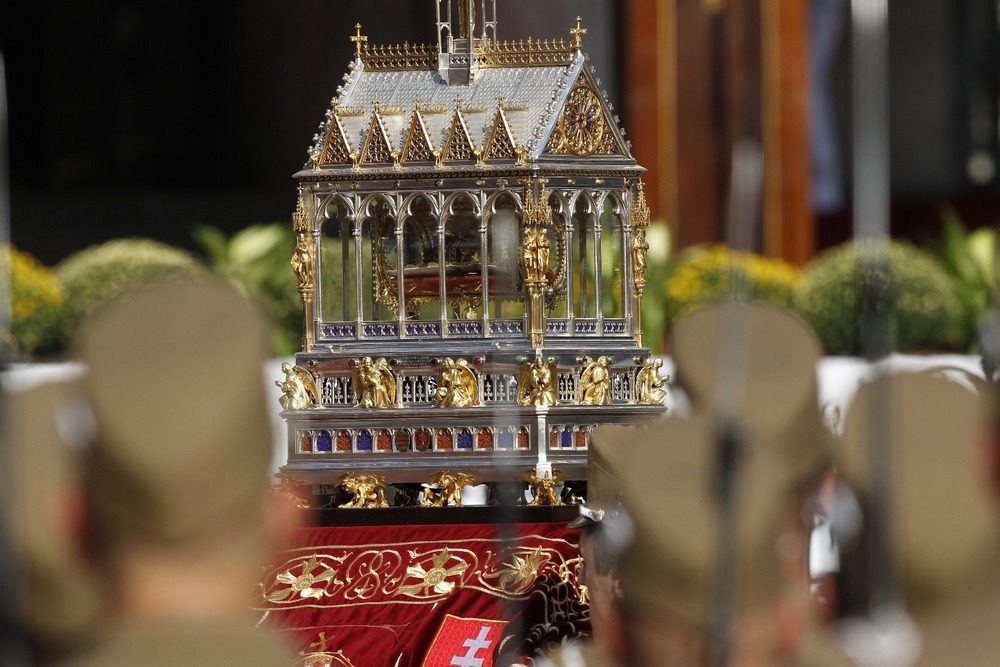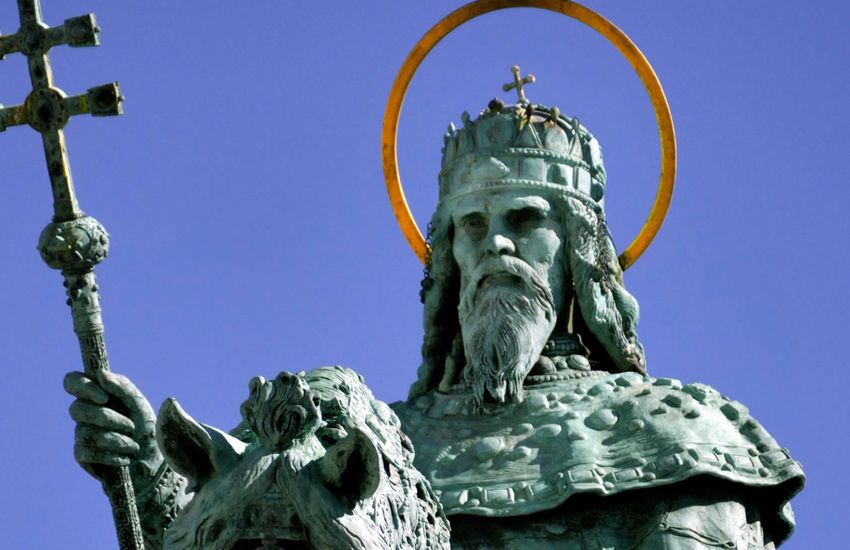After his death, King Saint László moved his predecessor's feast day to August 20, because in 1083, Stephen's relics were raised on the altar in the Székesfehérvár basilica, which was equivalent to his canonization.
The five-day difference resulted from the fact that they tried to open István's coffin for so long to no avail, and when they succeeded, those present found that it was filled with a pink liquid, the remains smelled of balsam, and their right hand was found intact.
According to legend, the event was followed by many miraculous cures. VII. Gregory canonized him, making István the first Hungarian Catholic saint and also the first Hungarian saint king. It is interesting that on the same day his son, Prince Imre, who died young, and the latter's presumed tutor, Bishop Gellért, were also canonized. The Roman Catholic Church honors King St. Stephen as the patron saint of Hungary and the heavenly patron of the nation, as well as the patron saint of all Hungarian soldiers.
The entire Catholic world commemorates King St. István
From the reign of Louis I (the Great) (1342–1382), August 20 continued as a church holiday. The cult of King István spread throughout Europe, but he was officially canonized in the name of the universal church only much later, in 1686, by XI. Pope Ince, and his feast day became September 2. The Pope also ordered that on the anniversary of the recapture of Buda from the Turks, the entire Catholic world should commemorate the feast of St. Stephen every year, which the universal church has held since 1969 on August 16, one day after the day of the Assumption of the Blessed Virgin Mary.
XIV. Pope Clement reduced the number of church holidays in 1771, and St. Stephen's Day was also omitted from the holidays. Almost at the same time, Mária Theresa - with the consent of the Pope - ordered that the feast of the holy king, August 20, be a national holiday in Hungary and that it be included in the calendars. Also in 1771, the queen brought István's head relic, Saint Job, from Ragusa - Dubrovnik - to Vienna and then to Buda, which from then on was carried in a procession through the city every year on August 20.
Saint Job, whose reliquary was made in 1862, was evacuated to the West together with the Holy Crown at the end of the Second World War, and was brought home on August 18, 1945. Today, it is kept in the Saint Stephen's Basilica in Budapest.
After the defeat of the 1848-49 war of independence, the holiday could not be celebrated for a long time, because Saint István symbolized the independent Hungarian state. After the agreement of 1867, the holiday regained its old glory, in 1891 Franz József I declared August 20 a public holiday for industrial workers, and in 1895 the Minister of the Interior ordered that public buildings be hoisted with a flag with a coat of arms on this day .

The national relic of Szent Jobb at the St. Stephen's Day mass in front of the St. Stephen's Basilica in Budapest (Photo: MTI/ Zsolt Szigetváry)
After the Second World War, Hungarians could only publicly celebrate August 20 as a church holiday until 1947, and the Saint Jobb procession, which attracted hundreds of thousands of people at that time, was banned the following year. The communist system did not agree with the religious and national content of the holiday, but it did not see its complete abolition either, but rather changed it. The public holiday remained, it was first called the holiday of new bread, and then the Soviet-style constitution was scheduled to come into effect on August 20, 1949, as the founding of the new, socialist state. Between 1949 and 1989, August 20 was celebrated as Constitution Day, and in 1950, the decree of the Presidential Council declared it a holiday of the Hungarian People's Republic.
Official holiday of the Republic of Hungary
With the change of regime, the old traditions were revived, and since 1989, the Szent Jobb procession has been organized again. On March 5, 1991, the National Assembly, which was established after the first free elections in 1990, declared St. Stephen's Day as the official state holiday of the Republic of Hungary from among the national holidays - March 15, August 20, October 23. The Basic Law, which entered into force on January 1, 2012, also establishes August 20 as a national holiday, the official state holiday of Hungary.
Source: hirado.hu / MTI
Photo: MTVA/Csaba Jászai













